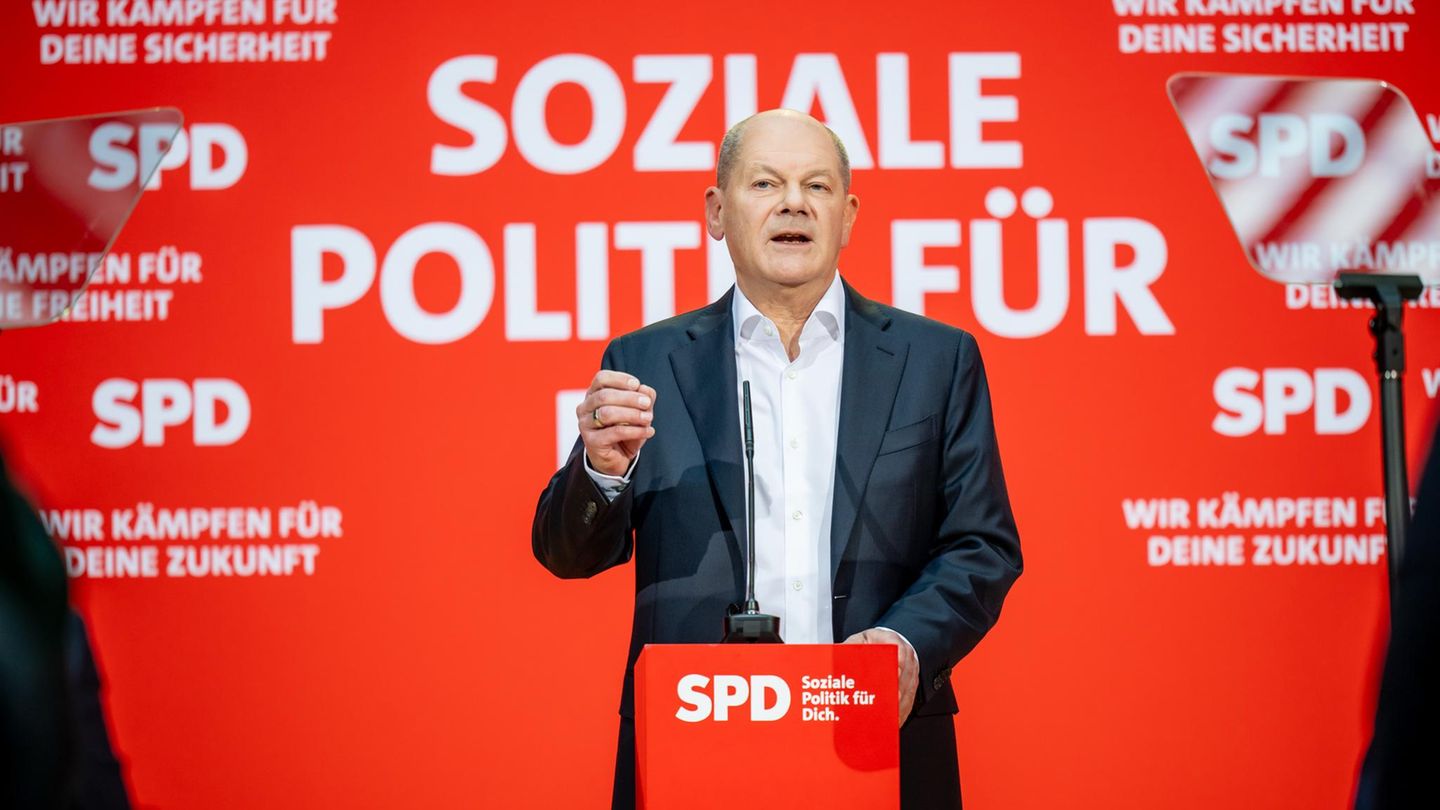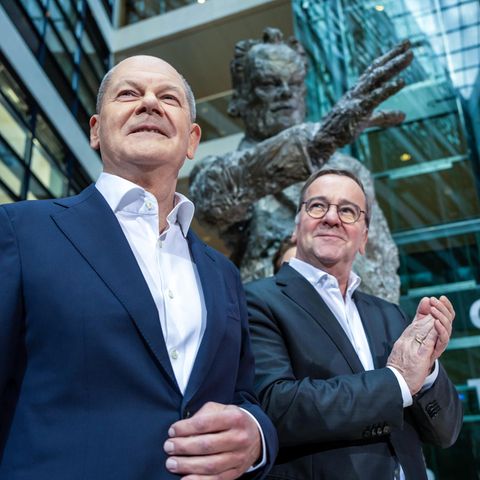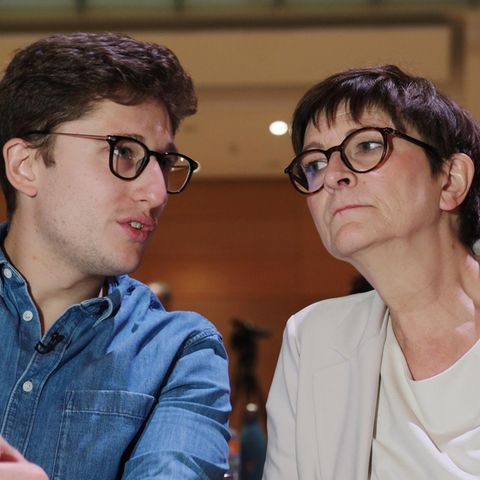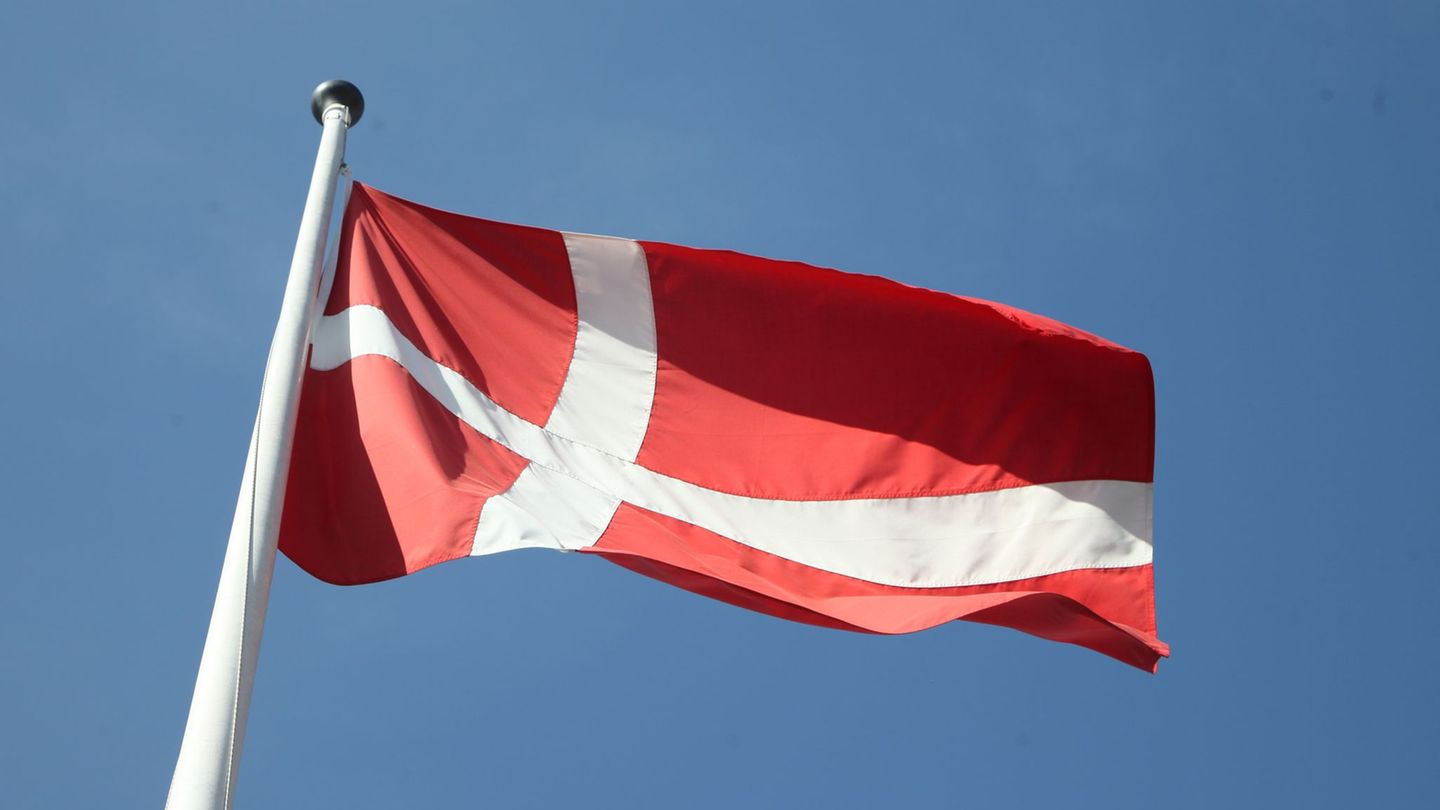“If we take a wrong turn now…”
How Scholz goes into open battle
Copy the current link
The Chancellor is taking up the fight, that is the message from Olaf Scholz at the start of the SPD election campaign – against the “Merz Union”, the “Lindner FDP” and the “hotheads” in the Ukraine war.
Olaf Scholz bows, enjoys the applause and occasional cheers. For almost an hour he outlined how he imagined this would happen: with his re-election, another victory for the SPD. In the end, not even his own comrades wanted to believe in that, at least not with him as the top candidate. Now the doubts seem to have disappeared.
Is everything okay again? Is something going on again? This much can be said after this Saturday morning, certainly to the relief of the ailing incumbent, but also of the party leadership: They can do something with this Olaf, aggressive and straightforward.
Mathias Miersch is already on fire. As the new SPD general secretary, he organized the “Election Victory Conference” at the party headquarters in Berlin. Now he rushes to Scholz on stage and shouts enthusiastically to the applause of the assembled Bundestag candidates and their campaign teams: “You are the right one for Germany!” This is followed by a courageous hit on a red buzzer, the trailer starts: “Chosen to stay” flickers across the screen. Now it’s time.
The SPD still has 85 days to turn things around and turn the current 14 percent in the polls into a victory. The conference is intended to be the official starting signal for a “short, crisp” election campaign, as party leader Saskia Esken says. Co-boss Lars Klingbeil also speaks of a “hard ride”. “The race to catch up begins today.”
Olaf Scholz against the “hot spurs”
In his first election campaign speech, Olaf Scholz explicitly targets “the democratic center”. The central sentence of his story: “The party of the center – in this election that is the SPD!” The message: It’s not the others, they don’t have the broad majority in mind, they can’t get it right. Whether with the economy, the welfare state or the war in Ukraine.
The “Merz Union”? Depicts Scholz as backwards, in every respect. Whether in civil and women’s rights, pensions and wages. “Our country has long since progressed much further than Friedrich Merz and his people!” shouts Scholz.
The Greens? If climate protection were to be carried out with the “green crowbar”, for many in the country it would only mean bullying and paternalism.
The “Lindner FDP”? Be market radical, a clientele party. The Chancellor complained that the Liberals had “systematically sabotaged” the government for months. He is alluding to an internal FDP paper in which a coalition break up to the point of “open battle” was outlined. Scholz throws himself into it with pithy words.
That’s the narrative, the Chancellor’s basic tone: I can do it, the others can’t. “In such serious times, our country needs serious politics,” he says at the beginning of his speech. No players, gamblers or risky adventures. The Chancellor presents himself as a stability factor, a voice of reason. “If we take a wrong turn in Germany, in this situation, then it will have serious consequences.”
The greatest possible fall height – and a daring strategy.
His image as a government professional has been badly damaged since the traffic lights went out. A disadvantage that the Chancellor obviously wants to make up for with his prudence in the Ukraine war. Scholz dismisses the others as “hotheads” who would play carelessly with Germany’s security.
Is Scholz playing on the Germans’ fear of war and their fear of escalation?
There is this accusation, but the Chancellor vehemently contradicts it. What is certain is that the question of war and peace will play a central role in his election campaign. He will present himself as a guarantor that there will be no escalation. And the competition as ill-considered and sometimes dangerous.
Friedrich Merz gave “the nuclear power Russia” an ultimatum that, in case of doubt, could lead to German cruise missiles being fired far into Russia. “All I can say is: be careful!” warns Scholz, clearly alarmed. “You don’t play Russian roulette with Germany’s security.” In the upcoming election, citizens would decide which course would prevail. “The more Putin foments the war, the cooler our heads must be.” In addition to continued support for Ukraine, Scholz promises: “I will remain steadfast and level-headed. You can rely on that!”
“Our party is a home to me”
Pointing the finger at the possible or alleged intentions of others may not be enough – the US election campaign has already shown that. Kamala Harris had vigorously worked on Donald Trump, but neglected her own profile and suffered a crushing defeat. Scholz obviously doesn’t want to make this mistake.
And so, in addition to the attacks on the competition, he rattles off a whole series of SPD party prose, renewing some well-known promises for stable pensions, more daycare places, higher taxes for the super-rich and more affordable housing. Scholz also explains some things concretely for the first time.
For example, Scholz wants a minimum wage of 15 euros “from 2026”, which means he is again planning to intervene by law – a commission actually regulates the amount. For 2025, he envisions a “firm cap” for network fees of 3 cents in order to reduce industrial electricity prices. Investments are to be promoted through a “Made in Germany” bonus and a “Germany Fund”.
This always causes enthusiastic applause in the Willy Brandt House, which on this morning resembles a red wagon castle. Red jute bags and scarves decorated with the slogan “Social Politics for You” are distributed at the entrance. The comrades’ declarations of war for families or justice jump out at you throughout the atrium. There are red gummy bears in red bags. If the statue of Willy Brandt wore a Scholz cap, it wouldn’t be surprising.
What is more surprising is the new enthusiasm for Scholz. The SPD has now found its official candidate for chancellor in the chancellor, which is actually an obvious decision. But due to his low popularity ratings, a day-long debate broke out in the SPD, extending from the grassroots to the Bundestag faction, as to whether Popularity Minister Boris Pistorius should instead enter the race.
“The social democracy stands together, the social democracy is highly motivated,” said party leader Klingbeil to the comrades from the constituencies present and their campaign teams. They are the ones who hang up posters and distribute flyers in the freezing cold and, last but not least, have to defend the Chancellor in the marketplaces. Consequently, for Scholz, the election campaign conference is also about dispelling any remaining doubts about his qualities as a driving force.
“Our party is a home to me,” he emphasized at the end of his speech. Next year he will be a member of the SPD for 50 years. His promise: He would give everything – “really everything” – that he could give in the next 85 days. “But I need you,” Scholz calls out to the crowd.
Some have already written off the SPD, as they did in 2021. “Don’t listen to them,” is Scholz’s appeal. They were wrong then and would be wrong this time too. “You know how election campaigns work. “I know how election campaigns work. So some people will be quite surprised.”
Source: Stern
I have been working in the news industry for over 6 years, first as a reporter and now as an editor. I have covered politics extensively, and my work has appeared in major newspapers and online news outlets around the world. In addition to my writing, I also contribute regularly to 24 Hours World.






